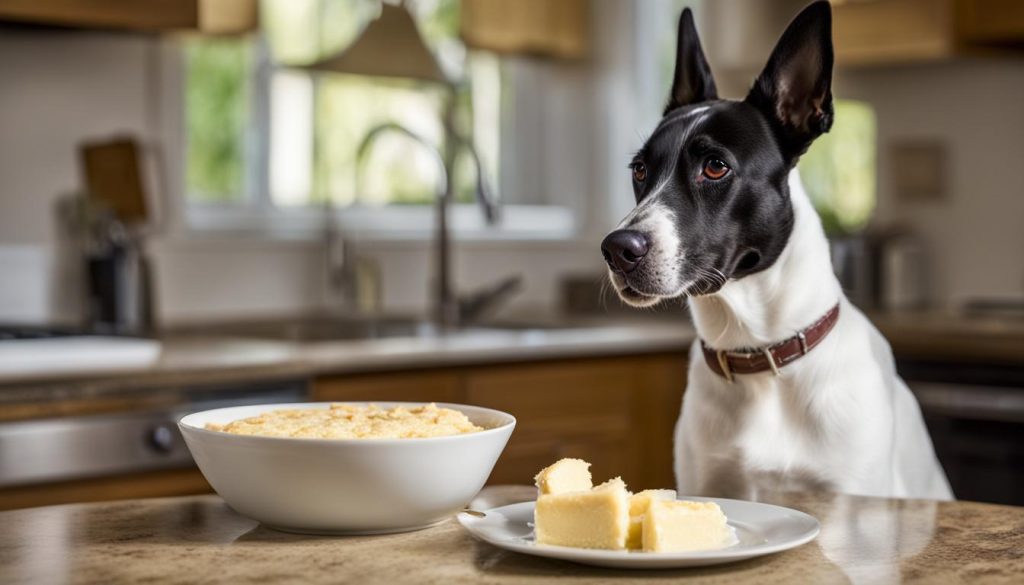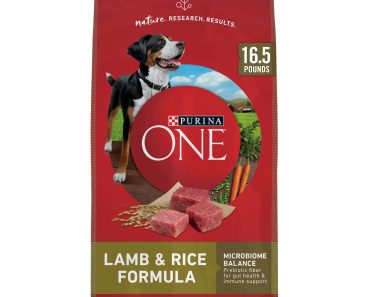As a dog owner, you may find yourself wondering what foods are safe and healthy for your furry friend. One popular question that often arises is whether dogs can eat banana nut bread. While bananas themselves are generally safe for dogs and can offer nutritional benefits, banana bread, particularly the nut variety, may not be the best choice for your canine companion.
Banana nut bread typically contains high levels of sugar and calories, which can contribute to weight gain in dogs. While small amounts of banana bread as an occasional treat may be acceptable, it’s important to be cautious about the ingredients used. Some common additives in banana bread, such as chocolate chips or macadamia nuts, can be toxic to dogs.
To ensure the well-being of your dog, it’s advisable to opt for homemade dog treats using dog-safe ingredients instead of sharing banana nut bread with them. This way, you have better control over the ingredients and can tailor the treats to your dog’s specific dietary needs.
Can Dogs Eat Banana Nut Bread? Yes, but it is not advisable.
- While bananas are generally safe for dogs, banana nut bread is not recommended due to its high sugar and calorie content.
- Avoid harmful ingredients like chocolate chips or macadamia nuts, which can be toxic to dogs.
- Consider making homemade dog treats using dog-safe ingredients as a healthier alternative to banana nut bread.
- Consult your veterinarian for personalized advice on your dog’s diet and treat options.
- Prioritize your dog’s health by choosing dog-specific treats or fresh bananas instead of sharing human indulgences like banana nut bread.
Can Dogs Have Banana Bread?
Dogs should not have banana bread as a regular part of their diet due to its high sugar content. While bananas themselves are safe for dogs and have health benefits, banana bread can contain harmful ingredients that can be toxic to dogs. It’s important to be aware of these ingredients and prioritize the safety of our furry friends.
Banana bread often contains additives like chocolate chips, macadamia nuts, or xylitol, which can pose serious health risks to dogs. Chocolate is toxic to dogs and can lead to symptoms like vomiting, diarrhea, and even seizures. Macadamia nuts can cause weakness, tremors, and other neurological issues in dogs. Xylitol, a sugar substitute, can be extremely dangerous and lead to a rapid drop in blood sugar levels, liver failure, and even death.
When it comes to choosing safe treats for dogs, it’s always best to consult with a veterinarian. They can provide guidance on suitable alternatives to banana bread and recommend treats that are specifically made with dog-safe ingredients. There are many commercially available dog treats that are nutritious and delicious, ensuring that our furry companions can enjoy a snack without any harm.
Remember, the health and well-being of our dogs should always be a top priority. While it can be tempting to share our favorite treats with them, it’s crucial to be mindful of the potential risks. By being informed and making smart choices, we can provide our furry friends with safe and enjoyable treats that are tailored to their specific dietary needs.
Is Banana Bread Good For Dogs?
Banana bread is a tasty treat that many humans enjoy, but is it good for our canine companions? While bananas themselves can be a healthy snack for dogs, the same cannot be said for banana bread.
Unlike fresh bananas, banana bread often contains added sugar and other ingredients that may not be safe or beneficial for dogs. The high sugar and calorie content in banana bread can contribute to weight gain and other health issues if consumed in large quantities.
However, bananas do offer some health benefits for dogs. They are rich in fiber, which can aid in digestion, and contain essential vitamins such as vitamin C and vitamin B6.
To ensure your dog gets the benefits of bananas without the drawbacks of banana bread, it’s best to opt for homemade dog treats. By making your own treats, you have control over the ingredients and can avoid harmful additives like sugar and artificial sweeteners.
There are numerous recipes available for homemade dog treats that incorporate bananas. These treats can be a healthier alternative to store-bought options and allow you to tailor the ingredients to your dog’s specific dietary needs. Plus, baking homemade treats can be a fun activity to bond with your furry friend!
Remember to prioritize your dog’s health and consult with your veterinarian before making any changes to their diet. They can provide personalized advice and guidance on the best treat options for your dog’s specific needs.
I always prefer giving my dog homemade treats made with love and care. They may not be as convenient as grabbing a slice of banana bread, but the health and well-being of our furry friends are worth the extra effort.
Banana Bread For Dogs
While banana bread is not recommended for dogs, there are many dog-friendly bread recipes available that incorporate bananas. These recipes are specifically formulated with safe and healthy ingredients for dogs, offering a tasty and nutritious treat option. Homemade banana bread for dogs can be made without harmful ingredients like chocolate chips or nuts, making it a safer choice for your canine companion.
Unlike traditional banana bread recipes, banana bread for dogs is tailored to their specific dietary needs. It uses dog-friendly ingredients such as whole wheat flour, mashed bananas, and sometimes even natural sweeteners like honey or applesauce. The result is a delicious and healthy treat that your furry friend will love!
Using banana bread as a base, you can get creative and experiment with different flavors and add-ins to cater to your dog’s preferences. You can try incorporating ingredients like pumpkin, peanut butter, or shredded carrots to enhance the flavor and nutritional value of the bread. Just make sure to use dog-safe ingredients and avoid any harmful additives.
Making banana bread for dogs is not only a great way to treat them but also an opportunity to bond and have fun in the kitchen together. Involving your dog in the baking process can be a wonderful shared experience, and they’ll be eagerly waiting for their homemade banana bread to come out of the oven!

If you’re interested in trying your hand at making banana bread for dogs, there are plenty of recipes available online. Look for recipes that prioritize the health and safety of dogs, and always double-check the ingredients to ensure they are appropriate for your dog’s dietary needs.
When making banana bread for your dog, remember to keep portion sizes in mind. While it’s a delicious treat, it should still be given in moderation to prevent overfeeding and maintain a balanced diet for your furry friend. As with any new food introduced to your dog’s diet, it’s always a good idea to consult with your veterinarian before making any major changes.
So, if you’re looking for a special treat to spoil your pup with, consider making homemade banana bread for dogs. It’s a dog-friendly alternative to traditional banana bread and allows you to provide your furry friend with a tasty treat while prioritizing their health and well-being.
Can Dogs Eat Banana Cake
Dogs should not eat banana cake as it typically contains high amounts of sugar, which can be harmful to their health. While small quantities of banana cake may not cause immediate harm, regular consumption can lead to weight gain and other health issues. It’s important to choose dog-friendly cakes that are specifically made with safe and healthy ingredients for dogs.
- Opt for dog-friendly cakes: When it comes to treating your canine companion to cake, it’s best to choose options that are specifically made for dogs. There are many dog-friendly cake recipes available that use dog-safe ingredients and are nutritionally balanced for your furry friend.
- Avoid harmful ingredients: Some cake ingredients, such as chocolate, can be toxic to dogs. Make sure to avoid cakes that contain chocolate or other harmful substances like xylitol, macadamia nuts, or artificial sweeteners.
- Consider healthier alternatives: Rather than feeding your dog cake, you can opt for healthier alternatives that provide similar flavors and textures. For example, you can make homemade dog treats using mashed bananas, whole wheat flour, and other dog-safe ingredients.
To satisfy your dog’s sweet tooth without compromising their health, it’s essential to prioritize their well-being and choose treats that are specifically formulated with their dietary needs in mind. By opting for dog-friendly cakes made with safe and healthy ingredients, you can ensure that your furry friend enjoys a tasty and safe treat.
Can Dogs Eat Banana Nut Muffins
Dogs should not eat banana nut muffins as they often contain nuts, such as black walnuts or macadamia nuts, which can be toxic to dogs. Nuts can cause vomiting, diarrhea, and other digestive issues in dogs, and some dogs may have allergies to certain types of nuts. It’s best to avoid feeding your dog any baked goods that contain nuts and be cautious of potential allergens.
If you’re wondering whether to share your banana nut muffin with your furry friend, it’s important to remember that nuts can be harmful to dogs. While some nuts are safe for dogs to consume in small quantities, others can be toxic and cause adverse reactions. Macadamia nuts, for example, can lead to weakness, tremors, and an upset stomach in dogs.
Why are Nuts Dangerous for Dogs?
Nuts can pose several risks to dogs. Firstly, they are high in fat, which can lead to pancreatitis, a serious condition that affects the pancreas. Additionally, nuts can cause obstructions in the digestive tract, potentially requiring surgical intervention. Lastly, certain nuts, such as black walnuts, can contain toxins that are harmful to dogs.
Are There Any Nuts That are Safe for Dogs?
While some nuts, like peanuts, are generally safe for dogs in moderation, it’s important to consult with your veterinarian before offering your pup any nuts. Each dog is unique and may have different tolerances and sensitivities to certain foods. It’s always better to err on the side of caution and avoid feeding your dog any nuts.
- Avoid sharing banana nut muffins or any other baked goods containing nuts with your dog.
- Monitor your dog for any signs of nut allergies, such as itching, rashes, or difficulty breathing.
- If you suspect your dog has ingested any nuts or shows symptoms of an allergic reaction, contact your veterinarian immediately.
- Stick to dog-safe treats and consult with your veterinarian for suitable and healthy snack options for your furry friend.
While it may be tempting to share your delicious banana nut muffin with your dog, it’s best to prioritize their health and well-being. By avoiding harmful ingredients and selecting dog-friendly alternatives, you can ensure your pup stays happy and healthy.
My Dog Ate Banana Bread
If your dog accidentally ingests banana bread, it’s essential to monitor them closely for any signs of illness or discomfort.
Depending on the ingredients in the banana bread, such as chocolate chips or nuts, there may be a risk of toxicity for your furry friend.
Symptoms of food poisoning in dogs can include:
- Vomiting
- Diarrhea
- Lethargy
- Changes in behavior
If you notice any of these concerning symptoms, it’s crucial to contact your veterinarian as soon as possible for guidance and appropriate treatment.
Can Dogs Eat Banana Peels
While dogs can enjoy the delicious taste and health benefits of bananas, it is important to note that banana peels should not be fed to dogs. Although the peel itself is not toxic, it can be challenging for dogs to digest due to its high fiber content. This means that ingesting large portions of banana peels can potentially cause gastrointestinal upset and even lead to a blockage in their digestive system.
It is best to err on the side of caution and avoid allowing your furry friend to consume banana peels altogether. Instead, focus on feeding your dog small pieces of the fruit itself without the peel. This way, you can still provide them with the nutritional benefits of bananas without exposing them to any potential risks or complications.
Can Dogs Eat Banana Chips
Yes, dogs can enjoy banana chips as a healthy and tasty snack. Banana chips are a dog-friendly option that can be incorporated into their diet in moderation. However, it’s important to consider your dog’s size and calorie needs when feeding them banana chips. Just like with any treat, appropriate portion sizes are key to maintaining a balanced diet for your furry friend.
When offering banana chips to your dog, keep in mind that larger dogs can consume more calories while smaller dogs should have smaller portions. It’s crucial to monitor their overall calorie intake to prevent overfeeding and weight gain. Banana chips should be given as a treat rather than as a substantial part of their daily meals.
Benefits of Banana Chips for Dogs
- Banana chips can provide dogs with essential nutrients such as potassium, dietary fiber, and vitamin C.
- They offer a crunchy texture that dogs may find enjoyable.
- Bananas are known to be gentle on a dog’s digestive system, making banana chips a suitable option for dogs with sensitive stomachs.
- These chips can serve as a healthier alternative to other commercially available dog treats that may contain artificial additives or excessive amounts of sugar and salt.
It’s worth noting that while banana chips can be a delightful snack for your furry companion, they should not replace a well-balanced diet. Always consult with your veterinarian regarding appropriate treat options and portion sizes for your specific dog.
Can Dogs Eat Banana Pudding
While small quantities of banana pudding may not be harmful to dogs, it is generally not recommended due to its high sugar content. Dogs should not consume large amounts of sugar on a regular basis, as it can lead to weight gain, dental issues, and potential health problems like diabetes.

Why is high sugar content a concern?
- Sugar can contribute to obesity in dogs, which increases the risk of various health issues.
- Excessive sugar consumption can lead to dental problems such as tooth decay and gum disease.
- Dogs are not designed to handle the high sugar levels found in many human desserts, and it can strain their pancreas.
- Sustained high sugar intake can potentially lead to the development of diabetes mellitus in dogs.
Healthier treat options for dogs
Instead of offering banana pudding, consider these lower-sugar alternatives:
- Fresh bananas: Dogs can safely enjoy plain, ripe bananas in moderation as a sweet treat.
- Dog-friendly desserts: Look for specially formulated dog treats that provide the taste and texture of dessert without the excessive sugar.
- Frozen fruit treats: Freeze small pieces of banana or other dog-safe fruits for a refreshing and healthier dessert alternative.
Remember, always consult with your veterinarian before introducing new foods into your dog’s diet. They can provide personalized advice based on your dog’s specific needs and health condition.
Conclusion
It is important to prioritize the health and well-being of our canine companions when it comes to their diet. While dogs can tolerate small amounts of banana bread as an occasional treat, it is not a recommended or healthy option. The high sugar and calorie content in banana bread can contribute to weight gain and potential health issues. Additionally, banana bread may contain harmful ingredients such as chocolate chips, macadamia nuts, or xylitol, which can be toxic to dogs.
Instead of sharing banana bread with your dog, it is better to opt for safer alternatives. Fresh bananas can be a suitable treat as they are safe for dogs and offer health benefits such as fiber and vitamins. However, it is always recommended to consult with a veterinarian before introducing any human food into your dog’s diet.
If you want to treat your furry friend to something special, consider making homemade dog treats using dog-safe ingredients. This way, you can control the ingredients and ensure that the treats are both safe and nutritious for your dog. By prioritizing their health and consulting with a veterinarian, you can provide your dog with the best diet options tailored to their specific needs.






